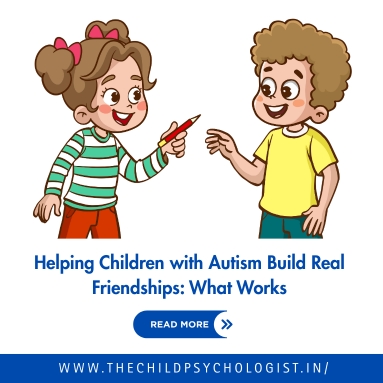By Dr. Vini Jhariya | Child & Clinical Psychologist | Founder, Urjasvini Child Development Center
One of the most common things I hear from parents is:
“My child wants friends—but doesn’t know how to make or keep them.”
For children with Autism Spectrum Disorder (ASD), social interactions can be overwhelming or confusing. But the good news is—they can build real, meaningful friendships with the right support and structure.
As the best child psychologist in Indore, I’ve seen firsthand how tailored strategies can help children open up, connect, and thrive socially. At Urjasvini Child Development Center, we focus on small steps that lead to big change. Here are four proven methods we use in our child counselling sessions in Indore to nurture lasting social bonds.
1. Structured Playdates (Not Just Free Play)
Children with autism feel more secure with routines. Unplanned or chaotic playdates can be too much. Instead:
- Plan short playdates (20–30 minutes max) with clear activities
- Use a visual schedule: show your child what happens first, next, and last
- Choose cooperative activities—like building LEGO, painting together, or baking simple cookies
Parent tip: Start with just one calm peer. Train them to be a gentle “social coach” to model kindness and patience.
2. Social Stories to Practice Everyday Moments
Social stories are short narratives that explain real-life situations using simple language and visuals. These help children mentally prepare for what’s expected in a social setting.
Example:
“When I see my friend, I can wave and say, ‘Hi!’ That makes them happy.”
Clinical Insight: Repetition is key. Reading the same story daily helps build understanding and confidence in real-life situations.
We incorporate these as part of our counselling for child behaviour sessions to make learning social cues a natural part of a child’s day.
3. Role-Playing Games at Home
Want to make social skills fun? Turn them into playtime!
Use role-play scenarios to help your child practice:
- Introducing themselves
- Asking someone to play
- Handling rejection or turn-taking
Add humor—use puppets, funny voices, or let your child “be the parent” in the scene.
Why this works: It creates muscle memory. When your child is actually in a similar real-world situation, their brain will remember what to do from practice.
4. Peer Buddy Programs in School
Children with ASD often feel isolated at school, especially during unstructured times like lunch or recess. A peer buddy program can change that.
- A buddy is a trained, kind classmate who supports your child during group activities
- Teachers and counselors can introduce simple scripts or visual guides for both children
- Buddies can also help during field trips, group projects, and birthday celebrations
Parent tip: Have a conversation with your child’s school about implementing a buddy system—it’s one of the most effective tools we recommend during child counselling in Indore.
Why This Matters
Children with autism want to belong, just like anyone else. When they’re supported in learning social skills—step by step—they can form meaningful friendships that boost their self-confidence and emotional well-being.
Friendship isn’t a fixed trait—it’s a skill that can be nurtured. With patience, consistency, and the right guidance, your child can build those social bridges.
Final Thought from the Best Child Psychologist in Indore
At Urjasvini Child Development Center, we believe every child has the potential to connect, grow, and feel included. With expert counselling for child behaviour, structured play, and parent involvement, we help children experience the joy of friendship in a way that feels safe and natural.
